In a heart-wrenching turn of events, the fragile hope of justice for religious minorities in Pakistan was shattered once again. On a quiet Sunday, June 23, the peaceful community of Christian Colony in Okara District, Punjab Province, was engulfed in turmoil as police, wielding the weight of the blasphemy laws, arrested a young Christian man. Chand Shamaun, only 26 years old, found himself trapped not by the hands of fate, but by the betrayal of his blood.
The morning’s serenity was disrupted by the arrival of officers from the Okara A-Division Police Station. Led by Deputy Superintendent of Police (DSP) Mehr Yousaf, they came not with justice but with a vendetta fueled by a familial feud over an ancestral home. The night before, Chand had clashed with his siblings over his rightful share of the property, a dispute that would lead to an unimaginable betrayal.
Christian leader Younis Chauhan, who stood witness to the unfolding nightmare, recounted the grim details. “The police asked us if we knew anything about a Quran desecration incident in the colony.” The community, steadfast and united, denied any such occurrence. But their words fell on deaf ears. DSP Yousaf demanded to be taken to Chand’s home, where the quiet of dawn was shattered as Chand’s elder brother, Zeeshan Shamaun, was dragged from his sleep and into the cold grasp of injustice.
Chand arrived amidst the chaos, only to be seized as well. The air was thick with disbelief and sorrow as area residents, desperate for answers, questioned the police. The response was a chilling testament to the fragility of their existence: they had received information that Chand had desecrated the Quran.
As the news rippled through the community, the weight of the government’s failure to protect its religious minorities became starkly evident. A key government minister’s admission on the floor of the National Assembly that the state had failed to shield them from false blasphemy accusations resonated with a painful truth.
In the heart of Pakistan, where hope often battles despair, the arrest of Chand Shamaun was a brutal reminder of the perils faced by those who dared to live by their faith. Amidst the cries for justice and the anguish of betrayal, the community stood together, resilient yet wounded, in a nation where their safety hangs by the thinnest of threads.
“We told the police that though the siblings often quarreled over their share in property, no blasphemy had been committed,” Chauhan said. “The DSP assured us that the brothers would be prosecuted under sections 147 and 151 of the Pakistan Penal Code for disturbing public peace, and they could obtain bail from the court on Monday.”

Hope flickered briefly, a fragile candle against the encroaching darkness. But just a few hours later, the flicker was brutally snuffed out. The tranquil streets of Christian Colony were suddenly awash with the ominous presence of eight to ten police vehicles, their lights casting a harsh glow in the early morning light as they cordoned off the area around Chand Shamaun’s house.
“It was then we came to know that police had registered a First Information Report (FIR) against Chand under Section 295-A of Pakistan’s blasphemy statutes and Section 9 of the Anti-Terrorism Act (ATA) 1997,” Chauhan recounted. Section 295-A, a law prescribing up to ten years imprisonment for “deliberate and malicious acts intended to outrage religious feelings,” and Section 9 of the ATA 1997, targeting “acts intended or likely to stir up sectarian hatred,” loomed over Chand like a dark cloud.
The realization of the grave accusations against Chand sent a shockwave through the community. Fear took hold, and several Christian families, their hearts pounding with dread, hastily locked their homes and fled the colony, haunted by the specter of violent reprisals from Islamist groups.
“Fortunately, there were no protests in the city, and residents have started returning to their homes,” Chauhan said. Chand Shamaun, an ambulance driver and father of two young children, was still trapped in a nightmare. His brother Zeeshan remained in police custody, their fates hanging in a precarious balance.
Attempts to reach their family for comment were met with silence, the weight of fear and uncertainty closing their doors. Meanwhile, Abraham Daniel, bishop of the Baptist Church in Sahiwal, voiced the community’s outrage and sorrow. “The police have registered a false FIR against Chand, and this miscarriage of justice cannot be ignored,” he declared.
In the heart of Okara District, amidst the turbulence and the tears, the struggle for justice continues. Chand Shamaun’s story is a stark reminder of the perilous path walked by Pakistan’s religious minorities, their lives perpetually overshadowed by the threat of false accusations and the relentless quest for truth and dignity.
“The FIR registered on the complaint of police Sub-Inspector Haider Ali alleges a horrifying scenario,” Daniel said. “Ali claims that he and five other policemen were standing outside the District Headquarters Hospital Okara when Chand Shamaun arrived and began shouting that he would burn the Quran because of his differences with Zeeshan and his sister Zunaira, who had converted to Islam some time ago.”
Daniel paused, the weight of the situation pressing down on him. “According to Ali, when the police tried to arrest Chand Shamaun, he fled on foot to Christian Colony.” “I believe that the allegation brought against Chand is based on police mala fide. They turned a family dispute into a religious incident when in fact no blasphemy had been committed.”
The misuse of blasphemy laws against Christians in Pakistan is a grim reality that Daniel and his community have come to know all too well. “False blasphemy allegations and cases have become a norm here,” he said. “The situation has reached the point where entire neighborhoods are abandoned merely based on accusation. The case against Chand is particularly concerning because the complainant is not a private individual but a police officer who concocted the incident.”
For Chand Shamaun and his community, the path forward is fraught with peril. As they navigate the treacherous waters of false accusations and institutional prejudice, their resilience and faith stand as a testament to their enduring spirit. But in the face of such overwhelming adversity, one question remains: how much longer can they withstand the storm?
